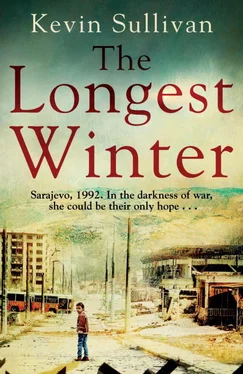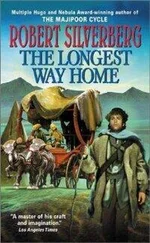Two explosions, about ten seconds apart, rocked the little lane where the tank was sitting. Jusuf and Haris saw smoke and heard shouting from the enemy infantry in the building next to the tank. There was more small-arms fire and then about twenty seconds later, mortar shells started slamming down on the position from which Zdravko and his crew had fired on the tank.
‘It’s a hit!’ Haris whispered. He was peering at the corner, which was obscured by smoke. ‘It’s a hit!’
They saw the cannon as the smoke began to clear. It wasn’t level, but raised a little. It started to disappear as the tank rolled back down the lane. Jusuf swore. They hadn’t eliminated it altogether.
‘Could be on an incline,’ Haris whispered. ‘Could be rolling back without any power.’
‘It’s moving back,’ Jusuf allowed. ‘Let’s get on with it.’
He switched the radio frequency and said into the cold receiver, ‘Viktorija. Viktorija.’
Read you.
‘One turtle stunned. You ready to come home?’
Ready.
He recited the withdrawal codes and listened as the Viktorija commander ordered his men back to the reserve line.
Haris and Jusuf waited for more than ten minutes. They returned to the cover of the table. Haris sat as though in a trance. He was close to collapse.
Then the radio crackled. Everyone home .
‘Let’s get your men out of here,’ Jusuf told Haris.
Haris moved out to the stairway, holding his left hand in front of him, the flower-patterned bandage covered in blood, and began ordering the withdrawal. Jusuf climbed down to the ground floor and walked to the edge of the entrance. He scanned the lock-ups on the other side of the square for any sign that the attackers had begun to move forward. Then he lunged out into the open and began running on the path between the shell holes and the piles of rusting steel and broken masonry. Above the sound of his own breathing he heard bullets.
Even if there had been no Olympics, Sarajevo would have presented a spectacular and intimidating proposition to three young women from Foča. It was a real city, a place where everyone didn’t know everyone else.
That morning, on the bus with Mira and Jasmina, Milena was elated. The skyscrapers in Alipašino Polje gleamed at the entrance to the city. The buildings went up and up in ragged rows. The impression of precipitous, grand, confident concrete was magnified by their location on top of a hill. They looked beautiful in the early morning. Milena gawked. Then she caught herself doing this and reined in her excitement. She didn’t want to look like an awe-struck country girl, particularly in front of the other two awe-struck country girls.
When the bus pulled into the terminal opposite the Tito Barracks and Milena, Jasmina and Mira climbed sleepily down to the platform the driver shouted, ‘Enjoy yourselves, ladies!’ and all three started giggling again.
The bus station was full of people. It was half past seven on a February morning. Cold enough to make the straps on a sports bag stiffen. They walked into the main terminal beneath a grey corrugated roof. The steel pillars holding up the roof looked newly painted. They were navy blue, bright and shining. The whole terminal shone. Snow was piled high on the dividing bays between the platforms, making white stripes on a field of water-black concrete.
Milena had never seen so many foreigners. There were people of every colour.
Tired, excited, uncomfortable from the long early-morning journey propped on a hard seat, Milena was seized by an unfamiliar joy.
There were tour guides with little flags organising groups of visitors. Small parties of brightly coloured anoraks and hats set off from the terminal like explorers. They had guides, or maps, or pieces of paper with addresses and instructions.
Mira’s uncle was supposed to meet the girls. But he was not there. They waited for twenty minutes. Then Mira went in search of a phone. Milena and Jasmina sat on the bags, looking out at the white stripes of snow, listening to foreigners chatting and laughing in their incomprehensible languages.
‘No answer,’ Mira confessed, crestfallen, when she returned. ‘Shall we walk there?’ she asked in a tiny voice. ‘It isn’t far.’
So they picked up their bags and instead of travelling by car as they had expected, grandly, like visiting princesses, they trekked in single file over snow-packed pavements to Čengić Vila.
It took them nearly half an hour, and when they reached Mira’s aunt’s house there was no one at home.
The apartment was on the first floor, up a double flight of steps. It was cold in the stairwell, like standing in a deep freeze. It was dark. The walls were grey.
Mira knocked on the door and rang the bell.
Milena put her bag on the floor and sat on it. She rummaged in her handbag for cigarettes. The packet was almost empty, bashed out of shape. She took one of the two remaining cigarettes and lit it. Exhaling, she looked ahead through the semi-darkness at the grey concrete.
Mira started to cry, because she had let the others down. Jasmina started to cry because she had been let down. Milena smoked.
They had been in the narrow, cold stairwell for more than five minutes when the door of the apartment opposite Mira’s aunt’s opened and a young man looked out.
Later, Milena told Jasmina and Mira that when she first saw Miroslav she saw her future, laid out like a piece of sheet music. She was already humming the melody in the time it took her to stand up and stub her cigarette out on the grimy tiles.
Miroslav looked a little like a rock star. He had just got out of bed and his hair stood up at the back; he was handsome if dishevelled.
He looked from one girl to the next, Milena last.
‘We are supposed to be staying here,’ Mira told Miroslav, pointing to the other apartment. ‘But my aunt and uncle didn’t come to meet us.’
‘You must be Mira,’ he said.
The girls let out a sigh like a gentle breeze, balmy on the frigid stairs. That Mira was known to her aunt and uncle’s neighbour augured well.
‘This is Jasmina and Milena,’ Mira said, relieved.
Miroslav looked from Mira to Jasmina and then to Milena. He put his hand out, open palm pointing down like a theatre usher showing patrons to seats in the front row. ‘They went to collect you at the bus station,’ he said. He had a pleasant voice, a light baritone shaded by amusement. ‘The car wouldn’t start so they left late. They probably passed you on the road. Come on inside and wait.’
They didn’t say anything, just trooped past Miroslav. Milena wanted to look at his face again. They almost touched in the doorway. She wanted to take his outstretched hand. He closed the door.
In the small, bright sitting room Mira and Jasmina sat on the sofa against the wall facing a teakwood and glass display cabinet that took up the opposite wall. There were crystal figurines – dogs and swans and elephants – in the central section of the cabinet. Milena sat on an armchair facing the door. Light streamed through the window behind her.
‘My name is Miroslav,’ he said.
He went into the kitchen, separated from the sitting room by a partition wall with a large opening. The girls looked at one another.
‘Coffee?’ Miroslav asked.
They said yes at the same time, a staggered chorus that made them start to giggle again.
He looked through the opening in the wall. Milena thought he would ask why they were laughing, but he didn’t. He looked at her, then turned away and began to grind the coffee. When it was ready he poured it into a small copper jug and brought the jug with four copper cups on a tray. He sat on a low wooden stool, facing Mira and Jasmina, and poured. Then he had to stand up again because he had forgotten to bring sugar. They watched him walk back into the kitchen. He wore faded blue jeans and a T-shirt bearing the name of a Yugoslav pop group. His hair still stood up at the back.
Читать дальше












